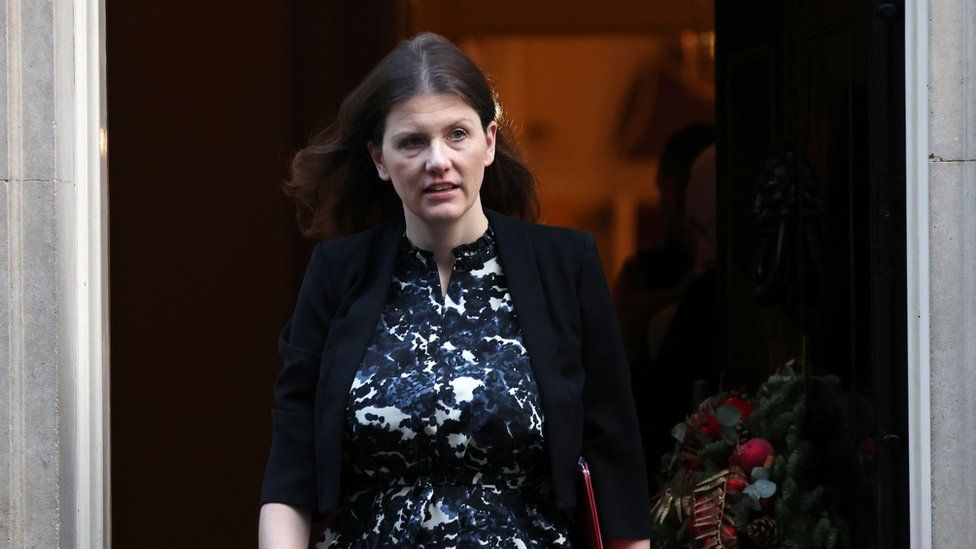
By Chas Geiger
Political reporter
It cost taxpayers £15,000 to cover damages paid to an academic Science Secretary Michelle Donelan falsely accused of supporting Hamas, her department has said.
The sum was paid “without admitting any liability”, the Department for Science, Innovation and Technology (DSIT) added.
On Tuesday, Ms Donelan retracted comments she made last year about Professor Kate Sang.
Ms Donelan said there was “no evidence” Prof Sang was a supporter of Hamas.
Labour and the Liberal Democrats have both demanded that Ms Donelan pay the bill for the damages and legal costs herself, while the University and College Union (UCU) – which represents many academics – described her position as “untenable”.
A spokesperson for DSIT said there was “established precedent” of ministers being provided with legal support for matters relating to their “conduct and responsibilities as a minister”.
Prof Sang launched a libel action against Ms Donelan after the minister tweeted a letter she had written in October to UK Research and Innovation (UKRI) – a public body which manages the government’s research funding.
In the letter, Ms Donelan accused the professor of sharing “extremist views” and expressing sympathy for Hamas after its 7 October attacks in Israel.
Hamas is proscribed as a terrorist organisation by the UK government and others.
Ms Donelan’s letter followed a tweet by Prof Sang saying “this is disturbing” alongside a link to a Guardian article on the response to the Hamas attacks in the UK.
In her statement on X, the science secretary accepted that Prof Sang’s comments referred to the Guardian story as a whole, and not just the headline which focused on the government’s crackdown on support for Hamas.
She admitted she had been wrong and had “misunderstood” the social media posts. She added that she had deleted her original post and fully accepted Prof Sang was “not an extremist, a supporter of Hamas or other proscribed organisation”.
As a result of Ms Donelan’s original claims, Prof Sang was subject to an investigation by UKRI – where she had recently been appointed to an advisory group on equality, diversity and inclusion.
The investigation uncovered no evidence that she had expressed extremist views or support for Hamas, or breached the terms of her appointment.
Prof Sang said she was “delighted that this matter has now concluded, but very disturbed by the way in which Michelle Donelan and UKRI behaved”.
“Had they asked me at the start, I would have explained the true position,” she said.
“Instead, Michelle Donelan made a cheap political point at my expense and caused serious damage to my reputation.”
‘Outrageous’
UCU general secretary Jo Grady called on Ms Donelan to resign and said she did not retain academics’ confidence.
She added that she had “failed to actually apologise to the individuals she falsely accused and attacked, or for the damage she has done to the academic community”.
Labour’s shadow science secretary Peter Kyle said Ms Donelan’s actions fell “so far below that expected of a minister”.
“It is outrageous that £15,000 of taxpayers money has been spent on the science secretary calling a scientist a terrorist sympathiser on social media, without any evidence at all,” he said.
“Michelle Donelan should be embarrassed, she should apologise and she should repay the full amount back to the taxpayer.”
Lib Dem deputy leader Daisy Cooper said: “This is nothing short of a scandal and we still don’t know the full legal costs.
“If Michelle Donelan had a shred of integrity left, she would pay for this bill out of her own pocket instead of asking taxpayers to pick up the tab. If she refuses to do so, Rishi Sunak should dock her pay.”
A DSIT spokesperson said: “There is an established precedent under multiple administrations that ministers are provided with legal support and representation where matters relate to their conduct and responsibilities as a minister, as was the case here.
“The secretary of state received the appropriate advice from relevant officials at all times.
“A sum of £15,000 was paid without admitting any liability. This approach is intended to reduce the overall costs to the taxpayer that could result from protracted legal action, no matter what the result would have been.”








